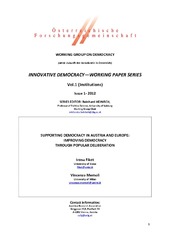Приказ основних података о документу
Supporting Democracy in Austria and Europe: Improving Democracy through Popular Deliberation’
| dc.creator | Fiket, Irena | |
| dc.creator | Memoli, Vincenzo | |
| dc.date.accessioned | 2018-07-09T12:28:26Z | |
| dc.date.available | 2018-07-09T12:28:26Z | |
| dc.date.issued | 2012 | |
| dc.identifier.uri | https://fedora.phaidra.univie.ac.at/fedora/get/o:107220/bdef:Content/get | |
| dc.identifier.uri | http://rifdt.instifdt.bg.ac.rs/123456789/1743 | |
| dc.description.abstract | Beginning with the Trilateral Commission report in 1975, recent studies have demonstrated increasing dissatisfaction with the performance of democracies across Europe (Crozier, et al. 1975). Citizens have become increasingly mistrustful of politicians, skeptical about institutions, and disenchanted with the effectiveness of the democratic process (Dalton, 2004). Recent longitudinal studies, analyzing satisfaction with democracy of European citizens showed that in many European countries satisfaction with national democracies flourishes and increases in time (see Wagner et al. 2009, Bellucci et al. 2012). At the same time, the scientific has been characterized by the development of different theoretical perspectives that all utilize different approaches in order to define and explain support for democracy. We will first attempt to understand what citizens effectively support when they say that they support “democracy.” In order to answer this question, we will briefly review the literature on popular support for democracy and then empirically explore the main theoretical model adopted in support for democracy studies in order to understand if it still explains today'ʹs empirical reality of Europe. In the second section we will try to assess where each European country is placed on key dimensions of support for democracy. In that way, we will be able to see where Austria stands within the European family in terms of support for democracy. Our third section explores the possibility of deliberative mini publics to improve popular support for democracy. The data we will analyze are produced by a deliberative poll experiment, EuroPolis, which took place in 2009 and involved random sample of European citizens. We seek to understand not only whether the citizens could become more supportive of the political system, after participating in deliberative process, as assumed by deliberative model of democracy, we also aim to learn something about the differences between the Austrian and European sample. | en |
| dc.language.iso | en | sr |
| dc.rights | openAccess | sr |
| dc.rights.uri | https://creativecommons.org/licenses/by-nc-nd/4.0/ | |
| dc.source | Innovative democracy | sr |
| dc.subject | deliberation | sr |
| dc.subject | support for democracy | sr |
| dc.subject | satisfaction with democracy | sr |
| dc.subject | quality of democracy | sr |
| dc.title | Supporting Democracy in Austria and Europe: Improving Democracy through Popular Deliberation’ | en |
| dc.type | article | sr |
| dc.rights.license | BY-NC-ND | sr |
| dcterms.abstract | Фикет, Ирена; Мемоли, Винцензо; | |
| dc.citation.issue | 1 | |
| dc.citation.volume | 1 | |
| dc.type.version | publishedVersion | sr |
| dc.identifier.fulltext | http://rifdt.instifdt.bg.ac.rs/bitstream/id/3710/bitstream_3710.pdf | |
| dc.identifier.rcub | https://hdl.handle.net/21.15107/rcub_rifdt_1743 |

